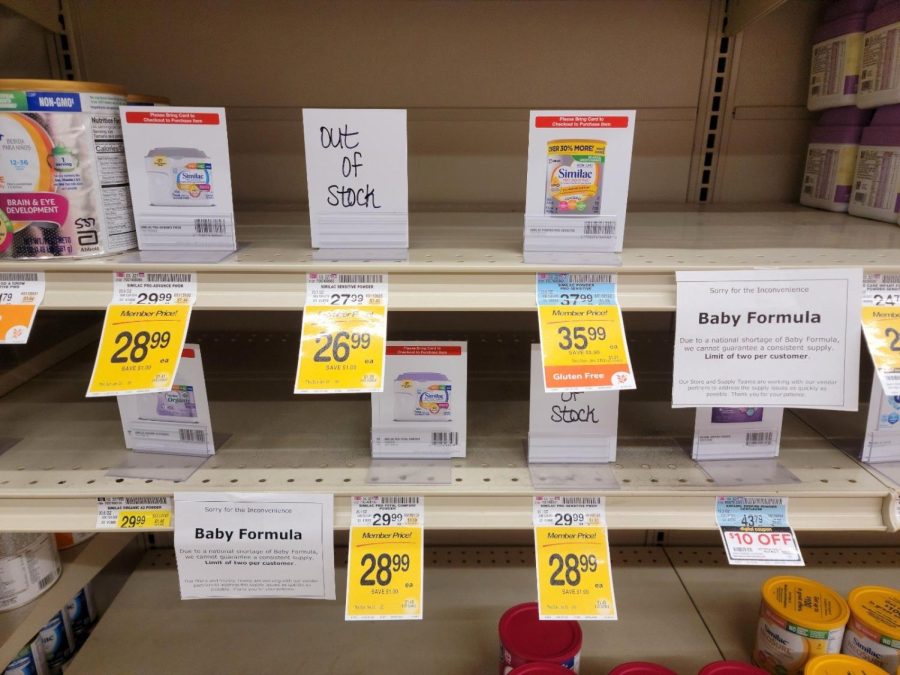A National Baby Formula Shortage: A Major Issue For Parents of Young Children
Bare shelves of infant formula at a store in Monroe, Washington. Image via. Wikimedia Commons
May 27, 2022
A combination of a February recall, supply chain issues, and labor shortages have worked together to result in a major issue for parents of young children: a formula shortage.
After the February recall in which Abbott, a formula manufacturer pulled products that were reported to have made four infants ill and caused the death of two infants, the national formula unavailability percentage stood at 43% last week.
Despite warnings, the issue came to a rise last week, resulting in the White House taking action to help provide relief for the problem.
For parents unable to breastfeed or who have a child with a health condition that makes certain formulas necessary, the situation can be described as “a life or death issue” as said by Democratic Sen. Kirsten Gillibrand of New York. According to the Centers for Disease Control and Prevention, only 1 in 4 parents solely feed their infants breast milk, which makes the issue a serious one for most parents with young children.
To help alleviate the problem, many have also called for President Joe Biden to consider using the Defense Production Act – a Korean War-era law that allows the president power to order companies to produce supplies during an emergency, which could help fight the issue.
By early May, the White House announced that Biden had spoken with formula retailers and manufacturers to ease the issue, and highlighted the steps they were going to take to hopefully reduce the severity of the situation.
In a video released by the White House, Biden personally said how he could empathize with those struggling because of the shortage. “I know parents across the country are worried about finding enough formula to feed their babies. As a parent and as a grandparent, I know just how stressful that is.”
In a statement, Biden also called the shortage one of his top priorities saying, “I’ve directed my team to do everything possible to ensure there’s enough safe baby formula and that it is quickly reaching families that need it the most.”
“Obviously the steps the president took today are an acknowledgement and a recognition that more needs to be done, that we do not want parents, mothers, families out there to be stressed and worried about feeding their babies,” White House press secretary Jen Psaki said.
On May 19, the House also debated and voted on a funding bill from Appropriations Committee Chairwoman Rosa DeLauro of Connecticut to provide $28 million to the FDA to address the shortage. The funds would go towards helping agencies hire more inspectors, boosting data collection on the formula marketplace, and blocking unsafe products from being available for purchase.
Another bill being considered is the Access to Baby Formula Act by House Education and Labor Committee Chairman Bobby Scott of Virginia and Rep. Jahana Hayes of Connecticut. The bill would allow for expanded access to infant formula by waiving specific requirements for low-income families participating in the Special Supplemental Nutrition Program for Women, Infants, and Children, especially when there is a public health emergency or a problem with the manufacturing of formula.
“We are in the midst of a national emergency where families are panicking as they work to prevent their babies from going hungry. … We are actively seeking teh consequences of an essential service throttled by a monopoly industry during a time of unprecedented supply chain challenges,” said Hayes at a press conference about the shortage.
Senate Majority Leader Chuck Schumer of New York said that lawmakers would try their best to pass formula-related legislation through unanimous consent, indicating that this is far from the last effort to address the crisis.
“We hope no one will block it. It’s such an immediate need,” Schumer told reporters. “We’d like to do more, but we want to move quickly because you know the crisis. You’ve all seen the pictures of the empty shelves in the supermarkets. If this bill can move quickly, we’ll move quickly. But it’s not going to be the last thing we try to do.”
Many parents have found themselves driving hours just to be able to get their children a meal. Kassidy Bell, mother of nine-month-old Quincey drove to another city just to be able to get the formula Quincey needed. Fortunately, Bell was able to find enough cans to last a couple of weeks.
“We got a taste of it during COVID not being able to find toilet paper and certain things,” Bell said. “But we weren’t expecting this at all. I don’t think many parents expect it. It’s so hard to be a parent in the first place, figuring out how to take care of your child correctly. To have this is just super stressful and unfair that people are going through this right now.”
And unfortunately, for those with children who have health issues and require a certain type of formula to be properly fed, the formula shortage has become a situation that could lead to possible death.
Two of Alexa Beichler’s sons were born with a metabolic condition called phenylketonuria (PKU), a condition that prevents their bodies from being able to process an amino acid found in protein. The condition requires Beichler’s sons to be on a specialized diet which limits them to two grams of protein a day.
But one day, Beichler’s shipment of formula was not complete, finding that she was missing formula for one of her sons. Beichler’s options for formula are extremely limited as her sons require a prescription-based formula which can only be supplied through the manufacturer. She began to panic and stress knowing that the specialized formula her sons needed would be out soon which would likely leave the family with devastating results.
“Our days are numbered. We have two weeks before we’re out of formula. I’m trying not to freak out. I’m trying not to think about it. I’m trying to get through each day as fast as I can and do what I need to do. The worst part is not knowing what’s next.” Beichler told People. “Over the past month, stress and anxiety is all I’ve felt. I literally go to bed thinking, ‘What are we going to do tomorrow?’ It’s not like I can give them cow’s milk because that’s too much protein. I can’t pour extra water in their formula to stretch it.” she admitted. “There’s literally nothing I can do. I am helpless. I’ve done everything in my power that I can possibly do.”
For those who are severely struggling from the shortage, the Health Department recommends families follow these key tips for the safety of their infants:
- Don’t water down the formula you do have.
- Never make homemade baby formula.
- For most babies, it is OK to switch from one milk-based or soy-based brand to another, including store brands. For babies that need specialized formulas, it’s best to talk with your child’s pediatrician.
- Do not substitute goat’s milk or plant-based milk for infant formula.
- If your child is older than 6 months and is usually on regular formula, cow’s milk can be used – but only temporarily and should not become a habit.
- People can also look into online retailers of infant formula, but it is incredibly important to ensure they are legitimate and safe sources. Only order from well-recognized distributors and pharmacies. You can better evaluate a company’s reputation through the Better Business Bureau.







